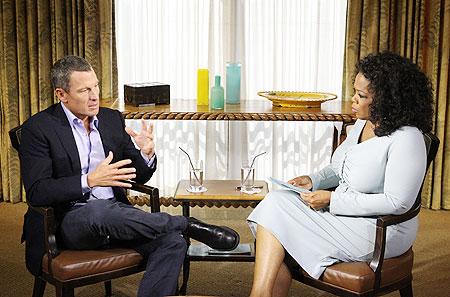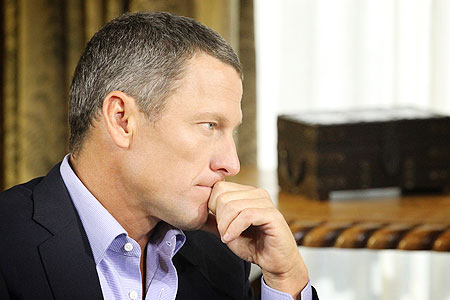 | « Back to article | Print this article |
World awaits Armstrong 'confession'
A road to redemption, or a path to prison? The jury is still out on exactly what Lance Armstrong's interview with Oprah Winfrey will mean for the disgraced cyclist.
Lawyers are divided on what the legal implications will be if, as expected, Armstrong admits to using performance drugs when the first part of his interview with Winfrey is broadcast from 9:30 p.m. EST on Thursday (0230 GMT on Friday).
And the general public are also split on what it will do to Armstrong's already shattered reputation.
Winfrey has let the cat largely out of the bag, confirming leaked media reports that Armstrong confessed to being a drug cheat, but stopped short of saying any more.
A cancer survivor who became a source of inspiration to millions of people after winning the Tour de France seven times, the sporting world already knew the real secret to Armstrong's success.
Doping officials banned him for life last year and stripped him of all his race wins after producing a mountain of evidence, including sworn witness accounts, that he cheated his way to victory.
All that remained was for the American, who had vehemently denied ever using drugs, to finally own up. Now that time has apparently come.
The report from the US Anti-Doping Agency that brought about his downfall described Armstrong as the ringleader of the "most sophisticated, professionalized and successful doping program that sport has ever seen."
While Winfrey confirmed that Armstrong had made some sort of confession in the interview, the extent of his admission remains a mystery to all but a few people.
"He did not come clean in the manner that I expected," the talk show host said.
"I didn't get all the questions asked, but I think the most important questions and the answers that people around the world have been waiting to hear were answered."
Winfrey said Armstrong came "ready" for an inquisition where his every word is sure to be heavily scrutinized.
Doping officials have already asked him to speak to them under oath and reveal everything he knows, something which could perhaps pave the way for a reduction to his life ban.
And while his legacy is seemingly tarnished forever, an admission could at least partly salvage some of his reputation among people willing to forgive and forget.
World awaits Armstrong 'confession'
"Armstrong benefits from the fact that we live in a society that forgives fallen heroes," wrote Scott Allison, a professor of psychology at the University of Richmond.
"Armstrong's suffering and squirming now is sowing the seeds for his later redemption."
For his critics, an admission of guilt and an apology is unlikely to sway their feelings towards him, according to University of Notre Dame management professor Emily Block.
"Our research would suggest his mea culpa to Oprah will be largely ineffective, as it is likely to be viewed through this lens," wrote Block.
"Even if he presents himself in the best possible light, acting contrite, taking responsibility and begging forgiveness, these behaviours are likely to be perceived as just another dishonest statement from an individual who has a bad character reputation."
The court of public opinion could be the least of Armstrong's concerns. Legal experts will also be tuning into the broadcast.
The 41-year-old Armstrong is facing legal threats to repay millions of dollars to various organisations, including a British newspaper he sued for libel and a Dallas-based promotions company that gave him a huge bonus for his Tour de France wins.
He could also face the prospect of jail time, according to some lawyers, with the US Department of Justice considering joining a whistleblower lawsuit filed against the cyclist by former team-mate Floyd Landis, according to US media reports.
"The difference between a case in which the government intervenes and one in which they don't is enormous," said Matt Orwig, a former federal prosecutor.
"It's a whole different ballgame."

© Copyright 2025 Reuters Limited. All rights reserved. Republication or redistribution of Reuters content, including by framing or similar means, is expressly prohibited without the prior written consent of Reuters. Reuters shall not be liable for any errors or delays in the content, or for any actions taken in reliance thereon.

